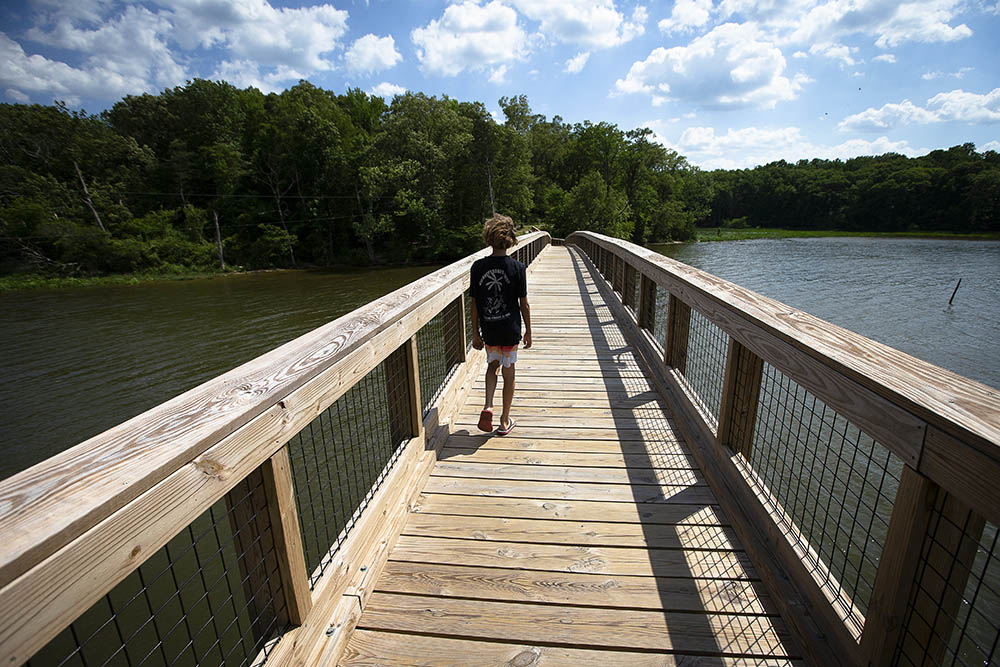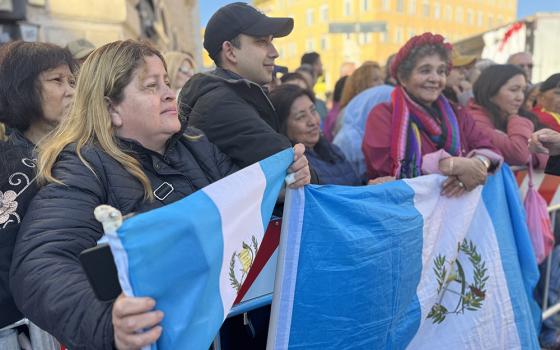
A boy explores Mattawoman Creek at Smallwood State Park in Marbury, Maryland, May 23. (CNS/Tyler Orsburn)
On Oct. 20, I stood before the U.S. Capitol with other leaders of faith to highlight for Congress and other U.S. leaders a topic not too common on Capitol Hill and in our public discourse: the greatest commandment.
For Catholics and other Christians, a shining light to guide us to common ground despite our differences is the greatest commandment. For Jesus himself said, "You shall love the Lord, your God, with all your heart, with all your soul, and with all your mind. This is the greatest and the first commandment. The second is like it: You shall love your neighbor as yourself. The whole law and the prophets depend on these two commandments" (Matthew 22:37-40).
Pope Francis expanded on this theme in his encyclical Fratelli Tutti, when he urged Christians throughout the world to see ourselves not just as neighbors, but as a "single human family" in which we are "brothers and sisters all."
With each day that passes, we see our precious human family and all the creatures that share our common home in greater peril, threatened by a cataclysmic climate crisis. Wildfires rage in the American West, deadly heat waves have killed hundreds, and droughts threaten some parts of the country, while storms, floods and avalanches tear through others.
These manifestations of the climate crisis continue to appear with greater frequency and intensity. As Pope Francis has said, "Doomsday predictions can no longer be met with irony or disdain."
But all is not lost. At the interfaith event last week in front of the U.S. Capitol — a 12-hour vigil — we prayed, spoke and called upon our sisters and brothers in Congress to support the once-in-a-generation opportunity offered through the Build Back Better legislation, to uplift the life and dignity of our vulnerable neighbors and the children yet to be born.
As the Senate considers the legislation this week, Pope Francis and President Joe Biden will meet at the Vatican, and the climate conference (COP26) in Glasgow, Scotland, will begin next week. As one of the world's largest polluters, we in the United States have a duty — a moral obligation — to ensure that Biden arrives at COP26 with meaningful commitments to clean up our mess, and that we work on solutions way beyond Glasgow.
Francis and his predecessors, St. John Paul II and Pope Emeritus Benedict XVI, find our mistreatment of God's creation to be a moral failing at its core. Despite our constant failures, God, who is abundantly patient, puts before us a choice each day. We can always redeem ourselves. For our nation's leaders, there's perhaps no more significant time to choose the common good over the next election.
Advertisement
This legislation has so much potential that could benefit so many people and create a more just, dignified and livable future, including provisions that address environmental injustice and that dramatically reduce greenhouse gas emissions. Together, we could rekindle authentic hope within so many souls across the U.S. and the world for a more compassionate and sustainable future.
But this legislation, like many efforts to care for our common home and future, encounters another once-in-a-generation phenomenon — a divisiveness across many dimensions of our society, including in Congress and in our own Catholic Church. We find common ground to be rare, and fewer people seeking to find it across differences.
We can find a way out together within our church, for we can dialogue with each other and the people we encounter with the greatest commandment as the cornerstone, from which the life and dignity of every human person is sacred, and care for our common home is within that call.
Here at Catholic Climate Covenant, we welcome institutions and members of the church to join this call. We encourage institutional support for a letter that urges Congress and Biden to take ambitious climate action for the common good that addresses the sources and threats of climate change.
Some 200 U.S. Catholic institutions, including archdioceses, dioceses and parishes, as well as universities, hospital systems and men and women religious communities, have signed thus far. In addition, thousands of people have signed our U.S. Catholic Climate Petition and action alert to Congress to support the Build Back Better legislation.
We have been blessed to lead and animate the U.S. Catholic Church's respond to the Vatican's Laudato Si' Action Platform, which we are celebrating through www.godsplanet.us, a website created in the service of our church. Our 400 creation care teams throughout the nation are planting trees, faith and action. Our young adult mobilization program is leading faith-filled witnesses for climate justice, and our Catholic Energies program just recently managed one of Nevada's largest nonprofit solar projects.
But there is so much left to do, and the greatest commandment gives us strength and resolve to keep going. Much of our future depends on what we, all of us, do in the weeks and months ahead. Young people, especially, have told us we must do more to live up to the demands of our faith.
So, we ask ourselves — and our brothers and sisters in Congress and our church — to rise above our differences and personal ambitions and see the greatest commandment that God has placed in each of our souls: to love God our Creator, and our neighbor — whether at home or abroad — as ourselves. In today's times especially, honoring this commandment is critical for each of us, for every person of faith. Our future depends on it.





